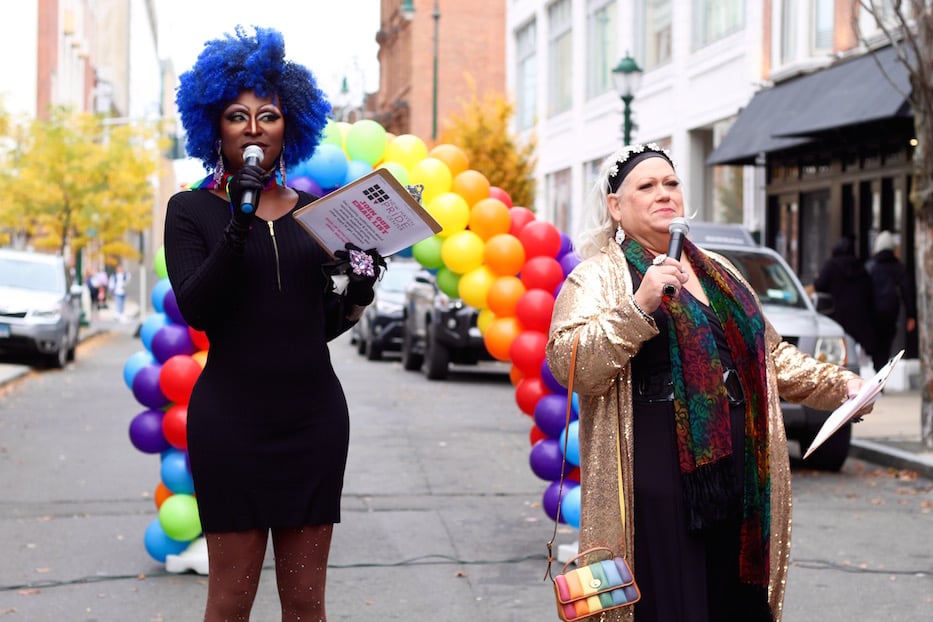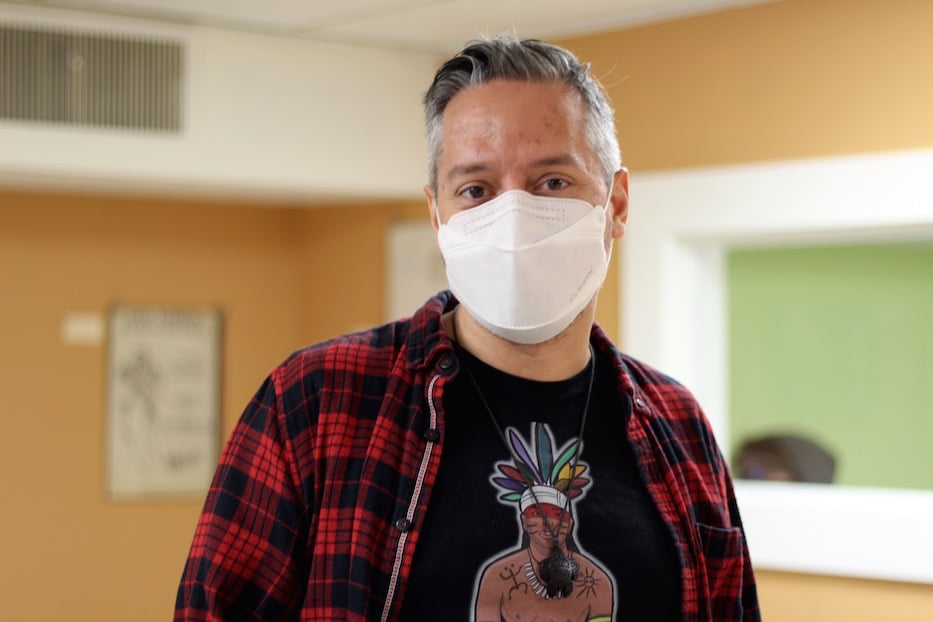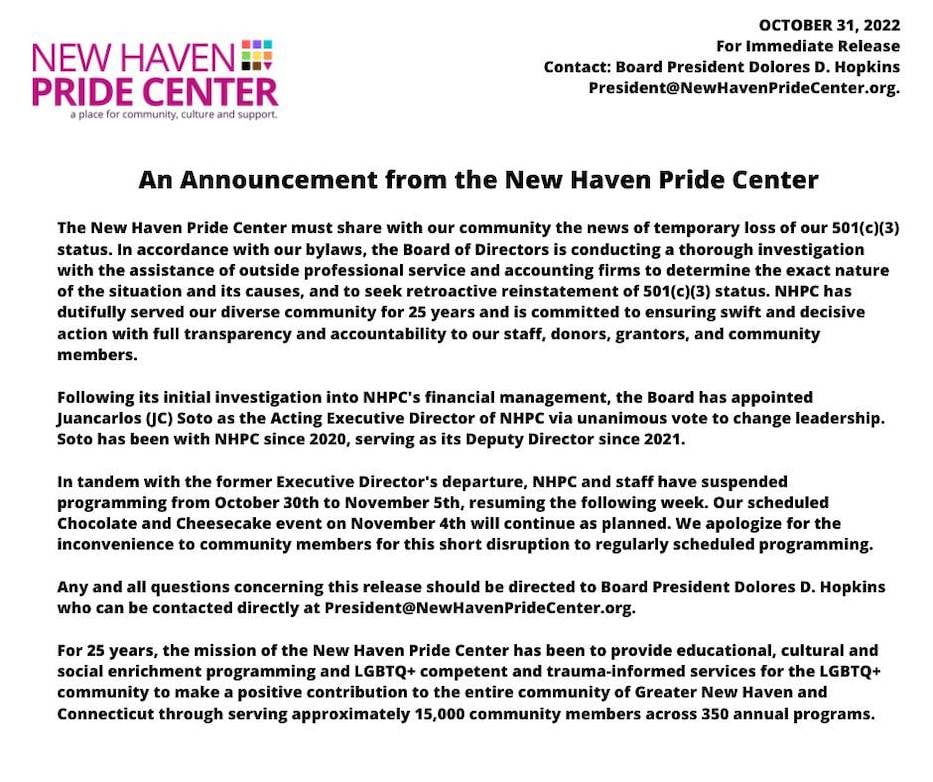
Emcees Sparkle Diamond and Dolores Dégagé Hopkins at a 25th anniversary celebration for the New Haven Pride Center in November 2021. Tuesday, Hopkins said that board member Kishorn Henry-Walker, Diamond's alter ego, has been incredibly supportive. Lucy Gellman File Photo.
An anchor of New Haven’s LGBTQ+ community has lost its 501(c)(3) nonprofit status and has replaced its executive director. Now, its board and acting executive director are working to restore it—and keep their doors open for years to come.
That news came from the New Haven Pride Center Tuesday afternoon, in an interview with Board Chair Dolores Dégagé Hopkins and Acting Executive Director Juancarlos Soto. Earlier this week, Soto was named to the position after the board began an investigation into financial management of the center. On Monday, the board voted to terminate Patrick Dunn, who became the Center’s first paid executive director in August 2017. Soto joined the center as director of case management and support services in February 2020 and became deputy director last year.
According to the International Revenue Service (IRS) database, the Center last filed a tax form 990-N in 2017. The IRS automatically revokes nonprofit status after three consecutive years of not receiving tax forms from a given institution. The Center is currently working with BryteBridge Nonprofit Solutions to get that status reinstated as soon as possible, Hopkins said Tuesday. She said that the Center has a second firm prepared to do a forensic audit if that is necessary.

Juancarlos Soto in November 2020, at the New Haven Pride Center. Lucy Gellman File Photo.
“The goal is to restore 501(c)(3) status, to continue to serve the community without interruption, and to put ourselves on the pathway to serve the community for another 25 years,” said Soto, referencing the Center’s 25th anniversary last November. “I hope that the community stands with us, and that the community knows that our doors will remain open to provide services and a space for those who need it.”
Center leadership and board members are “looking at other ways and different pathways to serve our community” while waiting for reinstatement of nonprofit status, he added. That may include finding a fiduciary or fiscal sponsor; the Center is not yet sure.
Soto stressed that the Center plans to continue serving New Haven’s large and multidimensional LGBTQIA+ community while also prioritizing the needs and wellbeing of its 12-person staff. After releasing a statement via social media on Monday night (see it below), it suspended its programming through Nov. 5, with the exception of a Wednesday afternoon vaccine clinic at the Center and Friday evening “Chocolate & Cheesecake” gala, a fundraiser for its LGBTQ+ Youth Conference.
The clinic, scheduled from noon to 6 p.m. Wednesday at the Center’s 84 Orange St. offices, is a collaboration with the Connecticut Department of Public Health. It will be offering Covid-19 boosters and both rounds of the Monkeypox vaccine.

Board member Hope Chávez confirmed that the Center also plans to hold an internal meeting with board and staff on Wednesday night. For the last few days, she and fellow board members have been at the Center, working closely with staff to keep operations going and move the investigation and 501(c)(3) status reinstatement process forward.
Next week, staff plan to resume programming, including support and affinity groups, case management services, a food pantry and community closet. Both Hopkins and Soto said that keeping staff on payroll is a priority—meaning that they are hopeful that donors will continue to support them.
“We need to keep operating because the community needs us,” Hopkins said, adding that board and staff are “full steam ahead” on working toward nonprofit reinstatement. “Hopefully our funders stick with us … We’re hoping we can keep the doors opened.”
The news around the loss of the 501(c)(3) status comes in a years-long period of growth for the Center, which last year absorbed some of the work of True Colors, Inc. after the organization suddenly shuttered. In the last five years with Dunn at the helm, the Pride Center has grown its footprint to include panels, art exhibitions, multiple “Days of Action,” support and affinity groups, and a food pantry and clothing closet that includes personal hygiene products.
During the first year of the pandemic, it rolled out virtual programming, supported dozens of suddenly out-of-work artists, and launched a food distribution hub that moved over 45,000 pounds of food out its door in 15 weeks. Staff, particularly Soto and Director of Youth Services Ala Ochumare, kept serving the community with case management, youth services and support, and programming designed for an intergenerational audience. Just last month, the Center brought Pride celebrations back to the New Haven Green for the first time since 2004, with a week of accompanying programs across the city.
A statement from the Center first posted to social media Monday stated that it works with over 15,000 people and hosts 350 programs a year. For the staff and board alike, it is an extremely personal and tender moment: many of them are the drag queens, the emcees, the moderators, the organizers, the award winners, and the artists who have helped bring programs into being.
In a phone call Tuesday afternoon, Chávez both expressed her concern for the staff and called the moment a chance to use transformative justice, which "requires everyone to consent to really, really hard conversations." She said she sees the internal work as part of a board’s essential function, and has watched as her peers “roll up our sleeves and be a working board” with her. In the Center’s Orange Street offices, they are working alongside staff to get all of the necessary documents in order.
“We need to get our 501(c)(3) status back but equally important is proactively repairing any relationships we're learning might be complicated and not as healthy as we thought,” she said. “It was important for the barrier between the staff and the board to come down.”
“I am also keenly aware of the fact that we employ people that are part of the vulnerable populations we serve,” she continued, encouraging people to check in with friends, family and peers who work at the Center, or rely on the Center’s services. “We're proud that we are ensuring that the dollars both from payroll and programming goes into the community that needs it.”